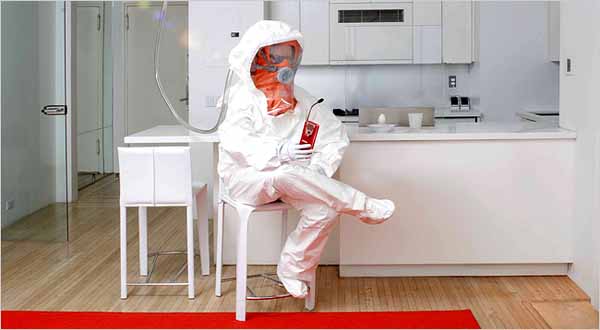This week I detox my apartment
It may not be evident from where you sit, but I’m currently experiencing slow death by tinned lima beans. I’ve been eating a stack lately, in seemingly benign ways – tossed through stews, in soups. It was always bound to catch up with me. And if it doesn’t, my Capricornian habit of efficiently freezing said meals in plastic containers ready for convenient reheating on busy weeknights most certainly will.
On Friday I invited “building biologist” Nicole Bijlsma into my apartment to do a toxic report on my two-bedder flat. She took a three-hour look at the way I live using a bunch of beeping devices. The report card came back: veritable marinade of toxins. Everything from the pot plant in my bedroom (a fungal breeding ground) to my lip balm habit is overloading my system. Our bodies are great detoxers, says Nicole, but the sheer quantity of pollutants we collide with today has pushed us to our limits. When we tip, an increasingly familiar host of “unexplainable” disorders – cancer, ADHD, fertility issues, auto-immune disease – kick in.
Oh. Dear.
But tell me, what’s more oh-deary for you: the feeling that, once again, you can’t do anything right these days (I mean, tinned lima beans…?!). Or the fact your gut has kind of known things aren’t right for a while? And you’ve erroneously ignored it?
This week I trawled through the conflicting, highly charged debates as to whether “science can prove” pollutants kill folk. It’s not conclusive, but the proof is trickling in. Canada has outlawed baby bottles made from BPAs, Teflon is being phased out voluntarily (!) in response to consumer demand, and the US National Academy of Sciences says 25 per cent of neurological and developmental problems in kids stem from everyday pollutants. It’s taking a while because this new form of dying is rather new and it’s the longterm, cumulative effects that matter.
Most of the detracting research focuses on short-term effects and is often – sigh – funded by large chemical or telecommunication companies. Until more of us die from prostate issues, more of our kids become addled with ADHD, and more of us fail to fall pregnant, I’m choosing to go with my gut. Mine says, listen up. So, back to the lima beans. Nicole says almost 100 per cent of food tins are lined with BPAs, a known hormone disrupter that leaches into food and causes just as many freaky issues in low levels, as in high. And tinned tuna? Brace yourself. Bruce Lourie, author of Slow Death by Rubber Duck, ate the stuff for three days and more than doubled his mercury levels to well above US government “guidelines”.
Do you store your food in plastic, too? OK, all is not lost. Look for the number inside the little triangle displayed on your containers and remember this mantra:
keep 1, 2, 4 and 5, all the rest are bad for you.
But never freeze or microwave plastic. Non-stick pans? Turf them, especially if they’re scratched. My microwave is a disgrace. That door mesh doesn’t do a thing, as Nicole’s beeper screamed at me. So stand at least 1.5m away when it’s on, she says. When microwaves first came out I used to glue my nose to the door to watch the magic happen. Which makes me despair for my brain wiring. So does news that my wireless router is frying my immune system. Nicole rattles off some instructions: get a hard wire, don’t use a cordless phone and limit mobile phone use.
On the upside, my (second hand) IKEA couch doesn’t contain flame-retardants (those Swedes are so on to it). Plus I have a stupidly strong sense of smell. This means I can’t abide smelly stuff. “Good,” says Nicole. “Anything perfumed, unless it’s pure essential oil, contains phthalates which disrupt hormones causing obesity, ADHD, early puberty and fertility issues. Avoid anything that lists ‘fragrance’ or ‘parfum’… it’s mostly code for phthalate.”
This detox was confronting. And I’m bracing myself for the sceptics who’ll claim it’s all ridiculous and that I’ve been hoodwinked. I counter with two words: hand sanitiser. For me the stuff emblemises our predicament. It’s made from triclosan which is now in thousands of products that you never knew needed sanitising (pizza wheels and shower curtains). Thing is, it’s a proven endocrinal disrupter. Studies are emerging to show that it’s contributing to bacterial resistance (ergo, the rise of “superbugs”) and recent research shows it doesn’t work and we don’t need it. We’re just told we do, says Bruce Lourie… by campaigns funded by triclosan manufacturers and detergent associations.
Hoodwinked, much?


